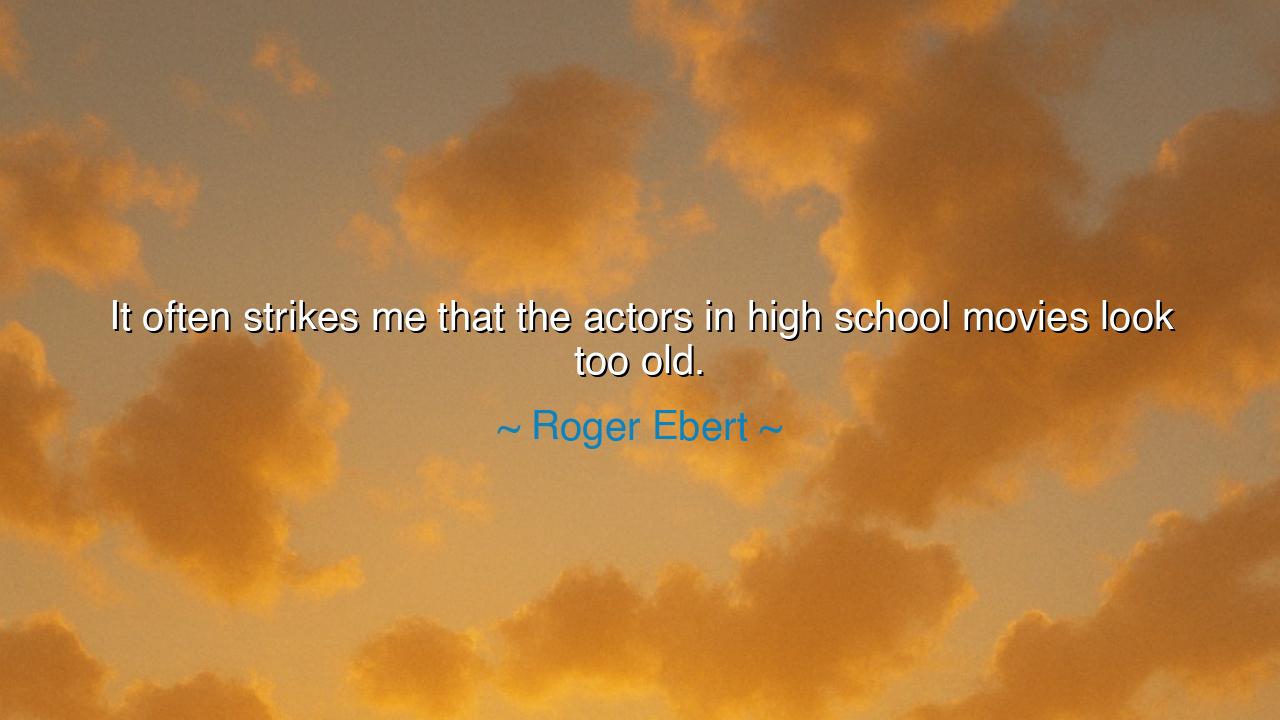
It often strikes me that the actors in high school movies look






In the reflection of Roger Ebert’s words, “It often strikes me that the actors in high school movies look too old,” there is a profound commentary on the distortion of reality in the world of entertainment. Ebert’s observation touches on a timeless truth: that the portrayal of youth and adolescence in film is often misguided, disconnected from the true essence of growing up. The notion that older individuals are cast as teenagers in films, while seemingly innocuous, speaks to the deeper layers of society’s perceptions of age, identity, and authenticity. This mismatch between the image of youth and the reality of age subtly influences how we, as a culture, understand the nature of growth and change in our own lives.
In the ancient world, the concept of youth was revered not only for its vitality but for the profound transition it represented from childhood to adulthood. In Greece, the ephebes, or young men, went through a rite of passage, a journey of growth that included both physical and intellectual trials. The philosophers—such as Plato and Aristotle—spoke of youth as a time of potential, of learning, and of laying the foundations for a virtuous life. However, the Greeks also understood that youth could not be fully realized without authenticity and truthfulness in its portrayal. When Plato wrote about Socrates, he captured the philosopher's youthful curiosity and sharp wit, even though Socrates was an elder. In a sense, the youthful essence Socrates embodied was more important than his age, much like how Ebert’s critique about high school movies suggests that the essence of adolescence in film often doesn’t align with the true nature of youth.
The Romans, too, had an understanding of adulthood and youth as distinct stages, but their focus on empire-building led to an almost romanticized view of youth as a time of unwavering ambition. The orators and statesmen like Cicero would speak of the virtuous youth who could one day become a wise leader, but they also understood the impression left on society by the images of youth—how the youth of Rome were often idealized in art, yet the realities of their struggles and growth were often glossed over. This tendency to portray a version of youth that is not entirely faithful to reality can be seen as an early form of media distortion, one that has carried through to modern cinema.
In the modern context, Hollywood has long been criticized for casting actors who are significantly older than the characters they play in films about teenagers. The images of youthful beauty and rebellious spirit are often portrayed by those who have already reached adulthood, leading to a disconnect between the lived experiences of real teenagers and the narratives we see on screen. Films like Grease or Clueless, for example, feature characters who are supposed to be in high school, yet the actors playing these roles often look and behave in ways that do not capture the rawness and vulnerability of true adolescence. This discrepancy between representation and reality speaks to our culture’s idealization of youth, and its failure to accurately portray the complexity of growing up.
Ebert’s critique calls for a more authentic portrayal of youth—a portrayal that goes beyond superficial charm and touches on the depth of the adolescent experience. The ancient Greeks and Romans would have appreciated this call for truth in representation, for they too sought to depict the struggles and virtues of the young. When Homer wrote about Achilles and his early struggles in the Iliad, he did not just idealize youth but portrayed the inner turmoil, the ambition, and the conflict that shaped the hero. Achilles was both youthful and flawed—his anger and pride were as much a part of his youth as his bravery. It is this authenticity that Ebert yearns for in the cinematic portrayals of youth.
The lesson here is one of honesty and authenticity. As a society, we must learn to look beyond the idealized images of youth and recognize that true growth comes from struggling, learning, and evolving. Adolescence is not just about energy and rebellion, but about self-discovery, vulnerability, and the gradual maturation of the mind and spirit. Cinema, like the literature of the ancients, has the power to shape how we perceive the world, but it must be grounded in the real experience of life.
In our own lives, we must be mindful of the images and stories we consume, remembering that authenticity in representation is crucial not only for entertainment, but for the values we pass on to future generations. Let us honor the real experiences of youth, with all its complexities, rather than perpetuate simplified or idealized versions of adolescence. By doing so, we can foster a more honest and compassionate understanding of the world, just as the ancients sought to understand their own through the truth of their art and literature. And in doing so, we honor the full human experience, from the youthful to the wise.






AAdministratorAdministrator
Welcome, honored guests. Please leave a comment, we will respond soon